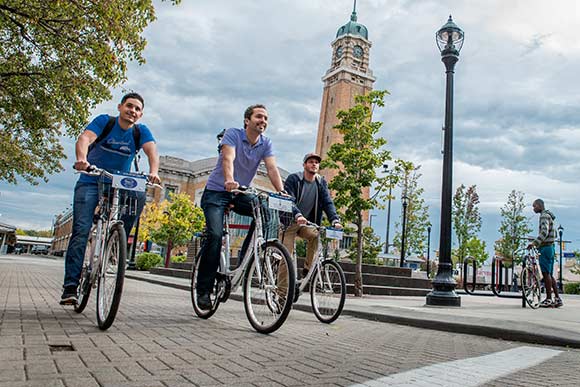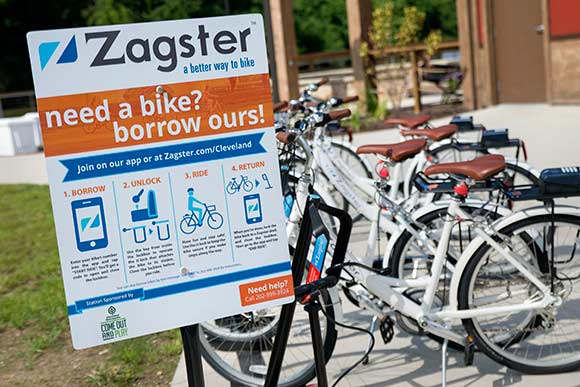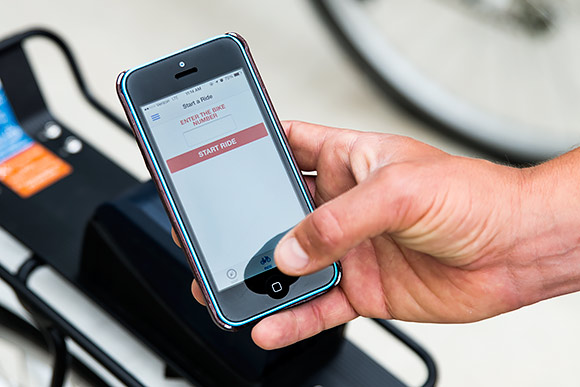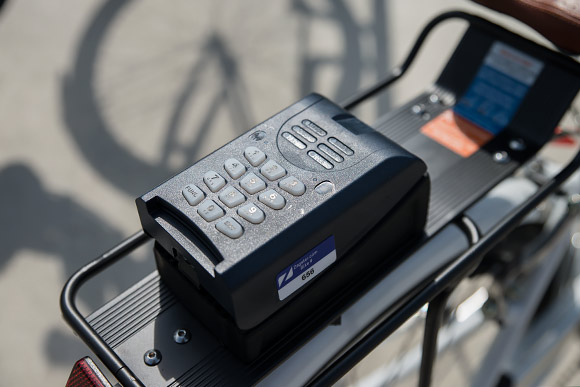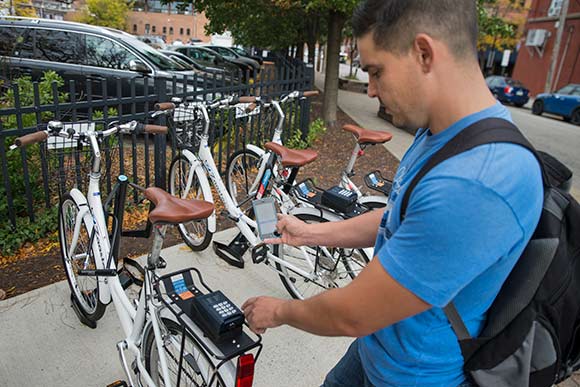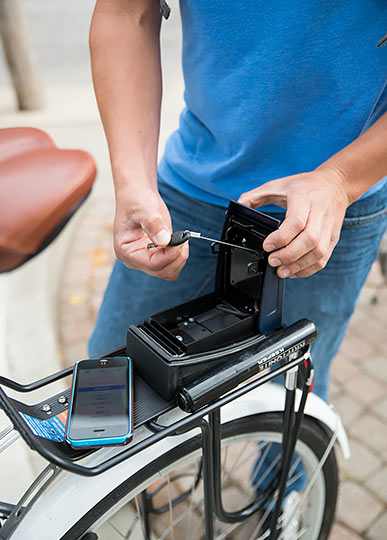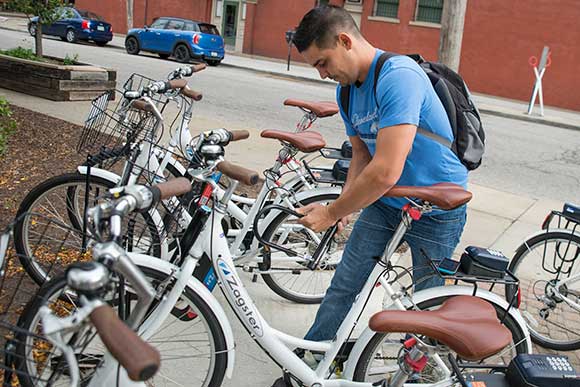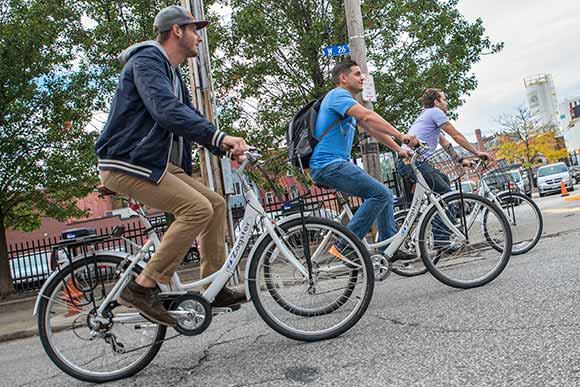wheels up: bike share plan aiming to make inroads throughout cleveland
If anyone wants proof that Cleveland needs a bicycle-share network, Platform Beer Co. co-owner Justin Carson has an anecdote for you.
Carson, sponsor of a recently launched bike-sharing program that offers rental bikes at six self-serve locations in Ohio City, saw a man outside his Lorain Avenue brewery eyeing the lineup of bicycles locked to the station there. The man only spoke Spanish, so Carson grabbed a bilingual co-worker who took the fellow through the easy process of renting a bike through a mobile app provided by the system. Moments later the man was pedaling down the block on his lightweight "Breezer" bike.
There have been dozens of stories like this since the privately-financed program launched in September. Commuters and visitors are using the system's 34 bikes at a clip of 17 rides a day, hopping from point to point along the bike-share route or just touring the city by two-wheeled means instead of four. The ease of renting and locking bikes at multiple stations around town means less traffic congestion and no more hunting for parking spaces, a pedestrian-friendly lifestyle that bike-share advocates believe can rise along with the system itself.
While Ohio City is currently the epicenter for bike share, Carson and other proponents of the nascent venture are confident the Spanish-speaking man's story will be replicated numerous times as additional stations are erected. With backing coming from a growing group of local business and civic entities, the city's bike-share revolution has only just begun, they believe.
In high gear
Three more stations provided by Zagster, a bike-sharing company based in Cambridge, Mass., will be rolled out before the end of October. They will be located at Civilization, a Tremont coffee shop, Barley House Cleveland in the Warehouse District, and outside the Courtyard Marriot in University Circle.
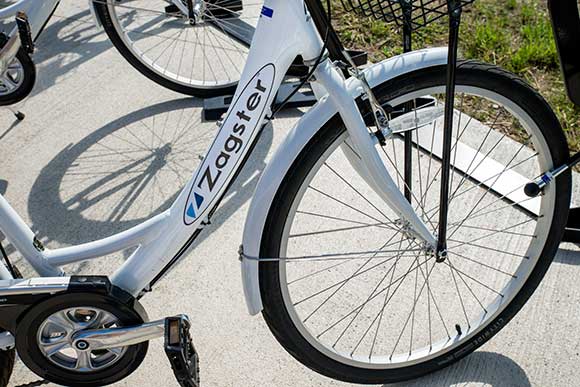 Zagster bike rental
Zagster bike rental
The trio of new stations totaling 18 bikes will lead into a winter of meetings with corporations and businesses interested in putting Zagster systems on their property, says Carson. Little Italy, Detroit Shoreway and East 4th Street are just a handful of 'hoods that may be adding 50 to 75 bike-share racks containing 200 bikes by next spring. Organizers have also discussed bike share with officials from Cleveland State University and Case Western Reserve University.
The individual owners and public institutions involved are paying for and sponsoring the stations at a cost of $7,200 each, says Carson. The inexpensive nature of the Zagster stations, compared to the pricey touchscreens and sometimes clunky docking stations of bike-share systems found in cities like New York and Boston, make installation fast and simple. If someone wants a Zagster rack in front of their business, all it takes is a real estate contract and insurance policy handled directly through the company. The entire process, from deciding you want a station to making it a reality, takes about two weeks.
"The sky's basically the limit as to where we can put these stations," Carson says. "We want to have them where people will be able to use them."
Both Zagster and local proponents are pleased by the usage numbers the system has tallied thus far, even if it's understood that a larger network of stations will be needed to make the enterprise viable.
The 17 daily rides will only increase as more stations pop up, says John Williams, president of Zagster's public relations firm. For now, Williams is impressed by the enthusiasm that has accompanied the project's kickoff.
"I think everyone involved would agree it's been a success," he says. "The fact that they're adding bikes is both representative of that success, as well as a way to better plan for future growth."
The wheel deal
Cleveland's private bike-share effort is the only one of its kind in the U.S., says supporter Sam McNulty, owner of Market Garden Brewery and a handful of other bars in Ohio City. McNulty is among a half dozen Cleveland proprietors and area leaders to pitch in money for the project. The venture's other partners are Carson of Platform Beer Co., Tom McNair, interim executive director of Ohio City Inc., Graham Veysey and Marika Shioiri-Clark of the Hingetown area of Ohio City, Brian Zimmerman, chief executive of Cleveland Metroparks, Daniel Brennan of Skylight Financial, and Rafid Fadul, a Cleveland Clinic doctor and property manager.
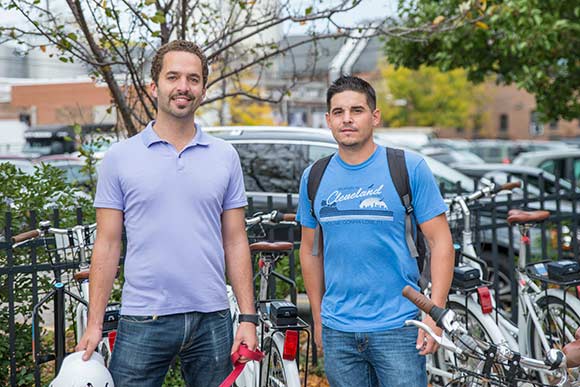 Sam McNulty, owner of Market Garden Brewery and Platform Beer Co. co-owner Justin Carson
Sam McNulty, owner of Market Garden Brewery and Platform Beer Co. co-owner Justin Carson
Bike share's early days have brought nothing but positive feedback, McNulty says. He recently met a posse of German twenty- and thirty-somethings in town on business searching for a fast and easy way to get around the city. The group grabbed nine bikes from a nearby station, riding to all points on the Zagster line on a sightseeing tour.
"Europe is much more bike-friendly than the U.S.," says McNulty. "(Bike share) allowed them to see a great and welcoming aspect of Cleveland."
While Cleveland has vowed to add 70 miles of bikeways by 2017, the city has lagged behind peer regions like Memphis and Detroit in making significant improvements to its biking infrastructure, McNulty maintains. With Carson as a driving force, Cleveland's private sector stepped in, pooling its funds to implement Zagster stations that allow commuters to rent a bike for $3 an hour with a maximum charge of $24 for 24 hours.
The model relies on light-framed bikes users can access for short trips via the Zagster Mobile App, available for iPhone and Android. A number on the bike is texted to Zagster, which supplies a code that disengages a lockbox. Once the bike is returned to a Zagster location, riders can text the word "end" to ready the bike for the next user.
Revenue from rentals will be reinvested into buying and installing more bike-share stations, says Carson. Each bike carries a logo of the various business owners involved.
"I look at it as advertising and marketing (for Platform Beer Co.), but any money we make will go back into bike share at the end of the year," Carson says.
Ohio City already thrives on a community sprit of collaboration, says McNulty, which makes the district an ideal center-point for an enterprise that increases non-auto transit while acting as a beacon for young professionals searching for a forward-thinking place to live.
"Do the right thing for citizens and the money will follow," McNulty says. "People are going to be excited to be shoulder to shoulder with other cities."
A far reaching network
Other areas of the country use Zagster for business-to-business use, but Cleveland would be the first to install the system city-wide should expansion reach that far, says Jacob VanSickle, director of biking advocate group Bike Cleveland.
Employees of Dan Gilbert's Rock Ventures/Quicken Loans firms in downtown Detroit are offered Zagster bikes at no cost. For Cleveland's civilian population, VanSickle would like to see a widely-dispersed web of stations, a possibility considering how quickly and cheaply the current smart-bike model can be set up, he says.
A Bike Share Task Force comprised of Cleveland's office of sustainability, Bike Cleveland and a dozen other agencies and neighborhood groups has its sights set on building up a network that would be accessible to a broad cross-section of people living in and visiting the city, VanSickle notes.
A preliminary bike-share feasibility analysis conducted for the sustainability office reported Cleveland could support a system of 77 to 140 stations in five communities, with core hubs downtown and University Circle and an eventual outreach into Midtown, Ohio City and Tremont. Details on cost and ownership of stations must still be determined, though the study points to U.S. bike-share models offering memberships of one day ($5 to $10) up to one year ($50 to $100).
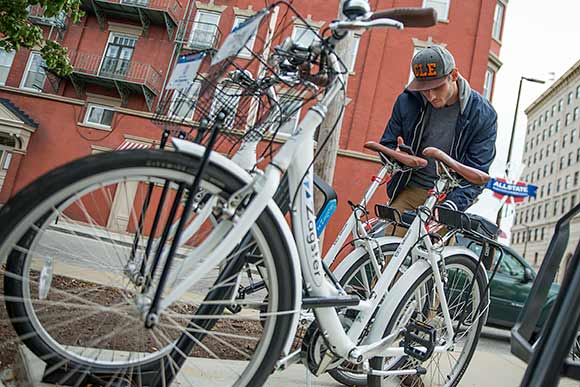 Zagster's Ohio City location
Zagster's Ohio City location
The taskforce, a separate entity from the existing group of private bike-share station owners, will evaluate the in-place Zagster network to determine if it could apply on a larger scale. Bike Cleveland is also in the midst of hiring a bike-share manager to organize the endeavor.
"Our goal for now is to evaluate and get real data on the ground to see how well the system's working," VanSickle says.
Meanwhile, energy from last month's Zagster unveiling has spun out across the Near West Side. On Oct. 10, Ohio City Incorporated announced a partnership with the Detroit Shoreway Community Development Organization, Tremont West Development Corporation and Bike Cleveland to raise funding for Zagster bike stations in these areas.
Through the online fundraising site CrowdRise, the neighborhood groups have set a goal of $25,000 to bring one station to each of the districts. Funding for the undertaking will be accepted through Nov. 7.
"Bike share is a great step for Cleveland," says McNair of Ohio City Inc. "Businesses all over the city have shown interest."
Tremont West program manager Lindsay Smetana, an avid cyclist herself, views Zagster as a unique way to grow Cleveland's bike culture, especially in a neighborhood like Tremont not exactly known for its access to buses.
"Tremont is always looking for alternative forms of transportation," Smetana says. "Bike share is a great idea, but it will only work in a strong network with a large scope."
Shared world
On a recent trip to Indianapolis with a coalition of Cleveland officials, Carson traversed the Indianapolis Cultural Trail, an eight-mile urban bike and pedestrian path downtown. The trail, a collaboration from the city and a handful of not-for-profit groups, features 250 rentable bikes at 25 stations.
Cleveland doesn't have anything that elaborate yet. Chris Ronayne, president of University Circle, Inc., simply wants more bike-share stations for his neighborhood, whether produced by the city or private enterprise. The burgeoning district is already adding bike racks outside of the forthcoming Happy Dog at Euclid and elsewhere, he notes, meaning extra transportation choices would be more than welcome.
"We're bullish about biking," Ronayne says. "My hope is we can accommodate all comers."
Private proponent Carson expects to communicate with the Bike Share Taskforce this winter, envisioning an association across all sectors of private and public advocacy to put out more stations once the weather warms.
"Everyone understands the value of having this type of low-cost option," says Carson.
McNulty of Market Garden is happily looking ahead to bike share getting spread to all points of Cleveland's compass.
"Anyone that wants in, we'll tell them the door's open," he says. "The more, the merrier."
Photos Bob Perkoski


